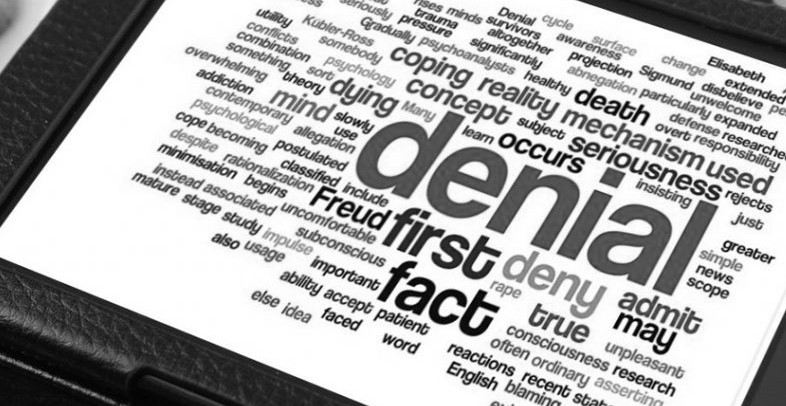The State of Denial
Posted on April 15, 2020
During the coronavirus outbreak I have been increasingly intrigued by the subject of denial. Please read into this as you will and feel free to comment. It is a subject I am learning as I go along, so I am not an expert, far from it (who needs experts eh?).
The reason I am intrigued by denial is because of how I have seen processes of it in myself and learnt how to override it. For instance, when I first heard about coronavirus, I tried to convince myself it was a storm in a teacup.
I still hope it is, but I have come to terms with the fact it isn’t. As the situation has evolved, people have released themselves from denial at varying stages (the Prime Minister, for example). However, some are so entrenched in denial , I wonder how they got to that stage and whether they can ever change?
Staying in Denial
Whilst the majority of folk have seen enough evidence that coronavirus is atough situation (people dying for example) I am intrigued by those who feel that the government who lead us, should be beyond scrutiny because we are in a health crisis.
Surely if there are glaring inadequacies in a process of locking down the nation and providing PPE for workers, it needs questioning? Some people, led by certain sections of the media, even thought it was inappropriate to discuss people dying because the Prime Minister was in poor health.
I have to say this because it is true. The same people who are in denial about the leadership qualities of the government are the same people who refused to debate the pros and cons of Brexit without getting angry. Anger of course, is linked to denial.
Key Areas of Denial
Here are the main types of denial. You may see yourself in some of these but don’t worry, we can all suffer denial; it is a human condition. In fact, it is healthy if you can see where you have indulged in denial.
1. Simple denial: occurs when someone denies a bad thing is happening. For example, a person with a terminal illness might deny that he/she is going to die.
2. Minimization: occurs when a person admits something bad but laughs off the seriousness of the situation. A person may have been told to stop drinking or they will become ill but just ignores it.
3. Projection: occurs when a person admits both the seriousness and reality of a situation but blames someone else.
It is number three (projection) that strikes a chord as I have seen several examples of it recently. Notably and disturbingly, we have seen the President of the USA doing this to the World Health Organisation.
UK Government Examples
We have seen potential examples of it here in the UK as well. These are more subtle, but you may have noticed a tiny minority of people who have been caught sunbathing or having a picnic being disproportionately attacked in the media or by the government. We also saw Matt Hancock sowing seeds off blame on NHS workers with regards to misuse of PPE (Personal Protection equipment).
Our government are not as brazen as Trump and his band of lunatics, but we need to be vigilant because they have populist tendencies. They have not liked being exposed for procrastination in the early stages of this outbreak. I believe they would, if possible, play the deflection game to save their own skin.
Citizens tend to indulge in projection denial as well. When I, or others have picked up on the mistakes made by the government in this current crisis, rather than debating, I have noticed people seeking to talk about someone else’s perceived failings. They would rather push the subject onto someone else, often an irrelevance.
“Imagine if it had been Corbyn or Diane Abbott?!”
Diane Abbott always gets it in the neck (I wonder why?) despite not being the shadow health secretary since 2016. That said, I suspect the Labour Party would have had similar issues because the underfunded state of the NHS didn’t start in December 2019 (PPE stocks have shrunk 40% since 2013).
Labour wouldn’t have been able to magic PPE out of thin air, that’s for certain. But they would have, in all probability. dismissed any idea of herd immunity or faffed about with locking down. However, we are dealing with what has happened, not might have happened if someone else was in power, so there is little point in debating it.
Other Types of Denial
Anyway, there are three other types of denial you may recognise.
1 Denial of denial: the denial of the unpleasant fact and the insistence that one is not experiencing denial.
2 Denial of cycle: the inability to acknowledge what is happening. Someone still supporting an individual or a cause despite the cycle of damage it has done to them.
3 Denial of responsibility: the failure to recognize a culpability in an unpleasant event caused by that person. An accident or a strategy gone wrong.
All very interesting stuff and worth looking at. If you deny that you have ever experienced any of the above, you may of course be in denial that you are in denial. What I think is important is to look out for these denial tendencies in our leaders and those who blindly support them, and be brave enough to question them.
That’s what democracy is for. Saying a government is beyond reproach just because the leader got sick, is a road to authoritarianism.
There’s no denying that.

Got something to say?